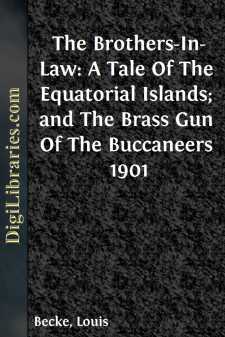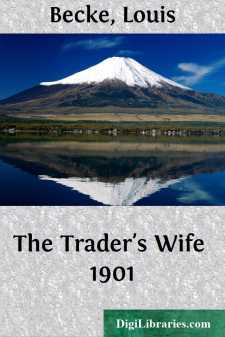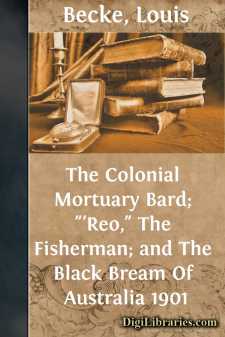Categories
- Antiques & Collectibles 13
- Architecture 36
- Art 48
- Bibles 22
- Biography & Autobiography 813
- Body, Mind & Spirit 142
- Business & Economics 28
- Children's Books 17
- Children's Fiction 14
- Computers 4
- Cooking 94
- Crafts & Hobbies 4
- Drama 346
- Education 46
- Family & Relationships 57
- Fiction 11829
- Games 19
- Gardening 17
- Health & Fitness 34
- History 1377
- House & Home 1
- Humor 147
- Juvenile Fiction 1873
- Juvenile Nonfiction 202
- Language Arts & Disciplines 88
- Law 16
- Literary Collections 686
- Literary Criticism 179
- Mathematics 13
- Medical 41
- Music 40
- Nature 179
- Non-Classifiable 1768
- Performing Arts 7
- Periodicals 1453
- Philosophy 64
- Photography 2
- Poetry 896
- Political Science 203
- Psychology 42
- Reference 154
- Religion 513
- Science 126
- Self-Help 84
- Social Science 81
- Sports & Recreation 34
- Study Aids 3
- Technology & Engineering 59
- Transportation 23
- Travel 463
- True Crime 29
Louis Becke
Louis Becke was an Australian writer known for his adventure stories set in the South Pacific. Born in 1855, he drew heavily on his own experiences as a trader, beachcomber, and government agent in the Pacific islands, which lent authenticity to his vivid tales. Becke's works, such as "By Reef and Palm" and "The Ebbing of the Tide," were popular in the late 19th and early 20th centuries, capturing the imaginations of readers with their exotic settings and adventurous plots.
Author's Books:
Sort by:
by:
Louis Becke
RÍDAN THE DEVIL RÃdan lived alone in a little hut on the borders of the big German plantation at Mulifenua, away down at the lee end of Upolu Island, and every one of his brown-skinned fellow-workers either hated or feared him, and smiled when Burton, the American overseer, would knock him down for being a 'sulky brute.' But no one of them cared to let RÃdan see him smile. For to...
more...
by:
Louis Becke
"There," said Tâvita the teacher, pointing with his paddle to a long, narrow peninsula which stretched out into the shallow waters of the lagoon, "there, that is the place where the battle was fought. In those days a village of thirty houses or more stood there; now no one liveth there, and only sometimes do the people come here to gather cocoanuts." The White Man nodded....
more...
by:
Louis Becke
Late one evening, when the native village was wrapped in slumber, Temana and I brought our sleeping-mats down to the boat-shed, and spread them upon the white, clinking sand. For here, out upon the open beach, we could feel a breath of the cooling sea-breeze, denied to the village houses by reason of the thick belt of palms which encompassed them on three sides. And then we were away from Malepa's...
more...
by:
Louis Becke
CHAPTER I Brabant's wife was sitting on the shady verandah of her house on the hills overlooking Levuka harbour, and watching a large fore and aft schooner being towed in by two boats, for the wind had died away early in the morning and left the smooth sea to swelter and steam under a sky of brass. The schooner was named the Maritana, and was owned and commanded by Mrs. Brabant's husband,...
more...
by:
Louis Becke
"Well, there's niggers an' niggers, some just as good as any white man," said Mr. Thomas Potter as he, the second mate of the island-trading barque Reconnaisance, and Denison the supercargo, walked her short, stumpy poop one night, "though when I was before the mast I couldn't stand one of 'em bunking too close to me—not for a long time. But after awhile I found out...
more...
by:
Louis Becke
THE COLONIAL MORTUARY BARD A writer in the Sydney Evening News last year gave that journal some amusing extracts from the visitors' book at Longwood, St. Helena. If the extracts are authentic copies of the original entries, they deserve to be placed on the same high plane as the following, which appeared in a Melbourne newspaper some years ago:— "Our Emily was so fairThat the angels envied...
more...
by:
Louis Becke
CHAPTER I "Hallo! young lady, what on earth are you doing here?" and Gerrard bent down over his horse's shoulder, and looked inquiringly into the face of a small and exceedingly ill-clad girl of about ten years of age. "Nothing, sir, I only came out for a walk, and to get some pippies." "And where do you get them?" "Down there, sir, on the sand," and the child...
more...
by:
Louis Becke
CAPTAIN "BULLY" HAYES In other works by the present writer frequent allusion has been made, either by the author or by other persons, to Captain Hayes. Perhaps the continuous appearance of his name may have been irritating to many of my readers; if so I can only plead that it is almost impossible when writing of wild life in the Southern Seas to avoid mentioning him. Every one who sailed the...
more...
by:
Louis Becke
A few weeks ago I was reading a charmingly written book by a lady (the wife of a distinguished savant) who had spent three months on Funafuti, one of the lagoon islands of the Ellice Group. Now the place and the brown people of whom she wrote were once very familiar to me, and her warm and generous sympathy for a dying race stirred me greatly, and when I came across the name "Funâfala," old,...
more...
by:
Louis Becke
"BULLY" HAYES! Oh, halcyon days of the sixties and seventies, when the Pacific was not, as now, patrolled by men-of-war from lonely Pylstaart, in the Friendlies, to the low-lying far-away Marshalls and the coral lagoons of the north-west; when the Queensland schooners ran full "nigger" cargoes to Bundaberg, Maryborough, and Port Mackay; when the Government agents, drunk nine days out of...
more...











